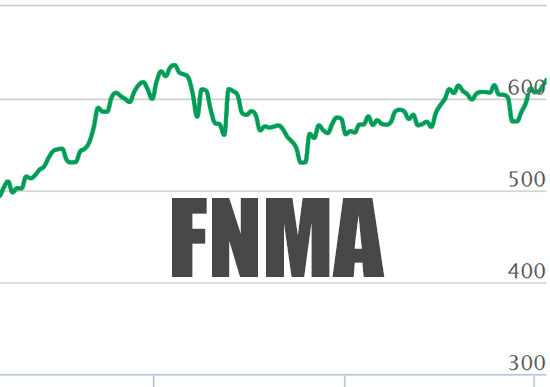Federal National Mortgage Assctn Fnni Me (OTCBB:FNMA) is making an explosive move upwards after the stock hit a low of $2 per share. FNMA has continued to make higher highs and higher lows after hitting a low of $1.43.
FNMA recently dropped as Billionaire investors that included the likes of the iconic Carl Icahn, Bruce Berkowitz, John Paulson, David Tepper, and Bill Ackman claimed the government acted illegally by making FnF pay them all of their massive profits in the form of dividends; the so-called sweep amendment. More on this later.
Fannie Mae (OTC: FNMA) operates as a government-sponsored enterprise (GSE). The Company conducts business in the U.S. residential mortgage market and the global securities market. It supports market liquidity by securitizing mortgage loans, which means it places loans in a trust and Fannie Mae mortgage-backed securities backed by the mortgage loans are then issued.
Fannie Mae is the largest backer of 30-year fixed-rate mortgages in the Country. FNMA purchases and guarantees mortgages through the secondary mortgage market and pools them to form mortgage-backed securities (MBS). Institutions including insurance companies, pension funds and investment banks purchase its MBS.
Fannie Mae is one of two of the largest purchasers of mortgages on the secondary market. The other is the Federal Home Loan Mortgage Corp., or Freddie Mac. Both are government-sponsored enterprises (GSEs).
Back in 2008 at the height of the credit crisis, FnF were bailed out to the tune of $187.4 Billion and taken over by the federal government. The common stock which was slated to get nothing was delisted to the OTCBB where it initially began trading for $0.30 per share.
Then something really unexpected happened; Fannie Mae returned to profitability and has been hugely profitable now for the last 10 quarters. In the first and second quarters of 2014 the Company earned $5.3 billion and $3.7 billion in net income, respectively.
As the good news kept coming from Fannie Mae the commons began to rise quickly becoming the top traded stock on the entire OTCBB market. As the excitement built and the majority sentiment was that the commons would end in the money the stock price exploded to a high of $6.35 per share.
Investors big and small bought into the excitement. Wall Street titans such as Bruce Berkowitz,, John Paulson, David Tepper, and Bill Ackman bought the commons. Even Carl Icahn joined in with Ackman acquiring a $50 million position via Bruce Berkowitz’s Fairholme Funds.
Then in August 2012 as FnF returned to profitability Treasury and FHFA changed the terms of the bailout, eliminating the dividend but requiring the companies to send all of their profits to the U.S. Treasury. Referred to as the Sweep Amendment if effectively prevents the Companies from being able to repay their loans and never get out from under the conservatorship.
As Fannie Mae profits soared the investors, led by the Billionaires tried to win support in Washington for their quest. When that failed they went to the courts. Over 20 lawsuits have been filed with Perry and Berkowitz among the first.
Their case rested on the belief that that both the Treasury Department and the FHFA violated the Administrative Procedure Act by exceeding their authority under the Bush-era Housing & Economic Recovery Act (HERA) and by acting in an arbitrary and capricious manner.
Perry Capital claims these violations occurred in August 2012, when Treasury and the FHFA amended the preferred stock purchase agreements between the FHFA and the Treasury Department to implement a full income sweep under which most of the GSEs profits go to the Treasury’s senior preferred stock.
The problem for the billionaires and shareholders has been that the Housing and Economic Recovery Act HERA that President George W. Bush signed into law gave the government extensive powers and authority to act in the face of a financial crisis. Judge Lamberth took note of this problem in deciding to dismiss the lawsuits filed by Perry and Berkowitz.
Judge Royce Lamberth served up a hard blow to shareholders last week but it may not be a knock-out blow as some have suggested. The decision is not binding on any of the other 20 + lawsuits and it’s widely accepted that the GSEs are essential to maintaining the type of housing market that Americans are used to with affordable 30-year mortgages.
The only logical end to this entire saga it seems is to return the GSE’s to the shareholders who they belonged to in the first place.

